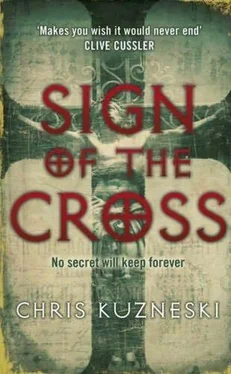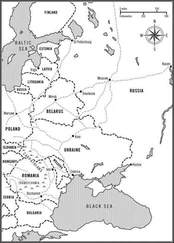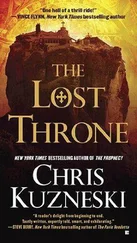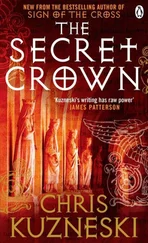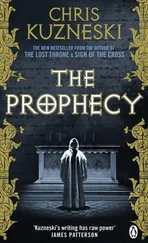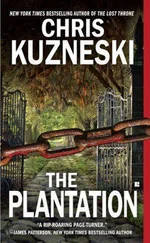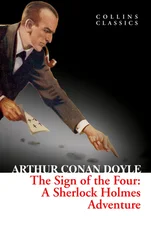Chris Kuzneski - Sign of the Cross
Здесь есть возможность читать онлайн «Chris Kuzneski - Sign of the Cross» весь текст электронной книги совершенно бесплатно (целиком полную версию без сокращений). В некоторых случаях можно слушать аудио, скачать через торрент в формате fb2 и присутствует краткое содержание. Жанр: Фантастика и фэнтези, на английском языке. Описание произведения, (предисловие) а так же отзывы посетителей доступны на портале библиотеки ЛибКат.
- Название:Sign of the Cross
- Автор:
- Жанр:
- Год:неизвестен
- ISBN:нет данных
- Рейтинг книги:3 / 5. Голосов: 1
-
Избранное:Добавить в избранное
- Отзывы:
-
Ваша оценка:
- 60
- 1
- 2
- 3
- 4
- 5
Sign of the Cross: краткое содержание, описание и аннотация
Предлагаем к чтению аннотацию, описание, краткое содержание или предисловие (зависит от того, что написал сам автор книги «Sign of the Cross»). Если вы не нашли необходимую информацию о книге — напишите в комментариях, мы постараемся отыскать её.
Sign of the Cross — читать онлайн бесплатно полную книгу (весь текст) целиком
Ниже представлен текст книги, разбитый по страницам. Система сохранения места последней прочитанной страницы, позволяет с удобством читать онлайн бесплатно книгу «Sign of the Cross», без необходимости каждый раз заново искать на чём Вы остановились. Поставьте закладку, и сможете в любой момент перейти на страницу, на которой закончили чтение.
Интервал:
Закладка:
‘Which means what?’ Payne asked.
‘Which means we’ve hit another roadblock. Right now there are three distinct possibilities in my mind. And as far as I can tell, we’re lacking evidence to prove any of them.’
‘Three?’
‘Yes, three,’ Boyd assured Payne. ‘Number one, everything went as Tiberius had hoped, and the Empire milked Christianity for three centuries before adopting it as its official religion. Number two, the crucifixion of Christ was faked, but future emperors went against Tiberius’s plot, thereby preventing the Empire from taking full advantage of the anticipated windfall.’
‘And number three?’
‘The death of Paccius — or another unforeseen obstacle — ended Tiberius’s plan before it could be carried out, meaning Christ was actually crucified, died, and was buried, then came back to earth to prove that he was, in fact, the Son of God.’
All of them sat, silent, pondering the final scenario.
Eventually, Jones cleared his throat and spoke. ‘So what are you saying? We’re stuck?’
Boyd nodded. ‘It’s starting to look that way. Unless you’re keeping something from us.’
‘I wish. But the truth is, my mind is spinning from all of this new information.’ Jones turned toward Payne. ‘What about you, Jon? Are you holding something back?’
Payne looked up from the photo of the stallions, half stunned by what he had just seen. So he rubbed his eyes and looked at the picture again. ‘Holy crap. I might be holding something back.’
‘You are?’
Nodding, Payne handed him the framed picture. ‘Look at this. What do you see?’
Jones glanced at the photo. ‘If I’m not mistaken, those are the Lipizzaners… Hey, did I ever tell you the story about General Patton and those horses?’
Payne rolled his eyes, thankful that he hadn’t brought it up earlier. ‘Come on, D.J., focus! Do you really think this is an appropriate time to talk about Patton and those albino ponies?’
‘No,’ he said, embarrassed.
‘Tell me, what do you see behind the horses?’
‘Behind them?’ He studied the building in the background. ‘I’m not sure. Is that the Hofburg Palace in Vienna?’
‘Yes it is. Now look at the artwork on the building.’
‘The artwork? Why in the world — ’
‘Dammit, D.J.! Just look at the picture!’
The black-and-white photograph showed the horses on their home turf, parading gracefully in the stone courtyard of the Hofburg grounds. Yet Jones had to ignore their magnificence. He had to force his eyes to look beyond the focus of the lens, to search the shadows and crevices of the building itself while ignoring the heart of the picture. Of course, when he came across the image in question, a look of revelation filled his face. ‘Oh my God! Where did you find this?’
But Payne chose not to answer. Instead, he simply leaned back and laughed as Maria, Ulster, and Boyd tried to attach meaning to Payne’s lucky discovery.
54
Frankie was the official spokesman for Università Cattolica , so he was well-known at the campus police building. He nodded at the man behind the front desk, a sergeant who had more important things to worry about than the midget from the PR office. It was the reaction that Frankie had hoped for. If his plan was going to work, he needed to be left alone for the next few minutes.
After checking the roll-call sheet, Frankie knew which officers were gone for the day and went to one of their offices. Acting quickly, he turned on the computer and accessed the police database, which allowed him to search for the identity of the men who died in Orvieto.
Shortly after spotting the first victim, Frankie found visual proof of a second soldier twenty feet away. That meant four people had died in the accident, not two, a fact that struck Frankie as suspicious. What were the two soldiers doing at the time of the crash? And why in the world were they outside the helicopter? That didn’t make sense. Neither did the cover-up in the middle of the night. Why remove the wreckage before anyone had a chance to examine it?
From his perspective, it reeked of conspiracy, even though he didn’t have much to go on.
He scanned the photo of the first corpse into the police computer, then narrowed the parameters of his search by eliminating men over forty-five years old. It was tough to determine the climber’s exact age because of his bruised and bloodied features, yet Frankie assumed that he had to be young. An officer with any seniority wouldn’t have been climbing the cliff face.
Pictures started flashing across the screen. Sometimes they lingered for an instant as the program examined distinguishing marks on each person — the slope of the man’s brow, the curve of his jaw, the length of his nose — only to be discounted a half second later. This went on for several minutes. Face after face whizzed by like passengers on a speeding train until the computer beeped, a sound that told him it had found a name.
Jean Keller, thirty-three, was born and educated in Switzerland, then moved to Rome in his early twenties to join the Guardia Svizzera , an elite fighting unit known as the Swiss Guard. According to tradition, the Guard had only one mission — to protect the pope — although Frankie couldn’t understand what that had to do with modern-day Orvieto. In fact, he was so confused by the guard’s dossier he double-checked Keller’s address and read the details of his career before he was finally convinced that Keller was a member of the Guard.
Which left Frankie with even more questions than he had started out with.
But instead of jumping to conclusions, he scanned the next picture into the computer and started a second search. The details of this photo weren’t as clear as the first one — Keller was in the sunlight, whereas this victim was in the shadows — but he still hoped to find something.
Ten minutes later Frankie found the type of data he was looking for, evidence so shocking it made him run to the phone.
The picture of the Lipizzaners had been hanging on Ulster’s wall for decades. He had passed it thousands of times and had never noticed anything other than the stallions themselves. At least not until Payne pointed out the statue of the laughing man behind the horses. A statue that decorated a famous Viennese building known as the Hofburg.
As Boyd, Maria, and Jones argued its significance, Ulster went downstairs to dig up information on the photograph. He knew his grandfather had taken the picture in the 1930s. What he didn’t know was if the statue was still in Vienna or if it had been a casualty of World War II. But even if that was the case, they still had visual evidence of the laughing man and could always contact historians at the Hofburg for additional information.
Strangely, while excitement erupted around Payne, he found himself sitting in the corner, trying to decide if he wanted to stay involved. Two weeks ago he and Jones were eating lunch in Pittsburgh. Now they were in one of Europe’s premiere research facilities looking for evidence that would obliterate the world’s most popular religion.
Did he really want to be a part of this?
And if so, which side should he be fighting for? For the Christians or the Romans?
On the surface, it seemed like a no-brainer. He should be fighting for Christ, right? Yet this issue wasn’t as black-and-white as it seemed. What if they found indisputable evidence that Tiberius had pulled this off, that he handpicked Jesus as the Messiah and managed to trick the masses of Judea? If so, what was the morally responsible thing to do? Should he allow Boyd and Maria to announce their findings? Or should he do everything in his power to suppress it? Should he call the Pentagon and ask for their advice? Or should he call a priest and ask for his?
Читать дальшеИнтервал:
Закладка:
Похожие книги на «Sign of the Cross»
Представляем Вашему вниманию похожие книги на «Sign of the Cross» списком для выбора. Мы отобрали схожую по названию и смыслу литературу в надежде предоставить читателям больше вариантов отыскать новые, интересные, ещё непрочитанные произведения.
Обсуждение, отзывы о книге «Sign of the Cross» и просто собственные мнения читателей. Оставьте ваши комментарии, напишите, что Вы думаете о произведении, его смысле или главных героях. Укажите что конкретно понравилось, а что нет, и почему Вы так считаете.
